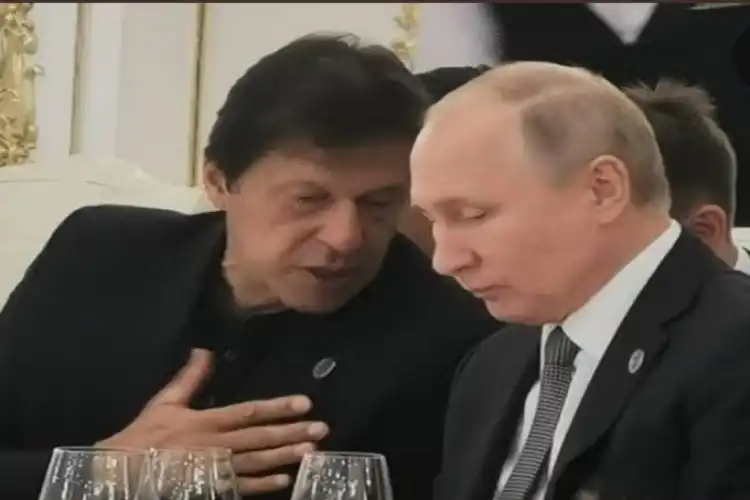Shantanu Mukharji
It would ordinarily be very unusual for a head of state or government to visit a foreign country when the latter is engaged in a full-scale war with a neighbour. And yet, Pakistan’s Prime Minister Imran Khan recently made a two-day Moscow visit when Russia had just embarked on a ‘military operation.’ During such military conflicts, a Prime Minister-level figure does not venture out of his country; nor does the host country entertain such visitors. It seems that a conspicuous exception was made in the case of Imran Khan.
The reasons given by Pakistan’s Foreign Office for this bizarre bilateral of Imran Khan are far from convincing. The officials argue that the visit was long overdue and unavoidable given that in Khan’s presence a multi-billion dollar energy deal was to be signed with a host of Russian oil companies. From this, a few questions arise: What was the tearing hurry, given this that would be the first visit of Pakistan’s Prime Minister to Russia in 20 years? Many analysts believe that China pressured Pakistan to join the Russia-led axis, apparently to keep Islamabad away from the US camp.
This is seen as a counter to the US’s anti-China stance and its attempts to woo India with Quad (a strategic security dialogue between the US, India, Japan, and Australia). Pakistan seems to be resetting its foreign policy with a thrust on reframing its relationship with Moscow now that the US has gradually created a strategic distance from Pakistan, especially after American troops withdrawal from Afghanistan.
Imran Khan’s Moscow visit has stirred a debate within and beyond Pakistan. Ayesha Ijaz Khan, a London-based lawyer of Pakistan origin and a columnist wrote in a Pakistani daily that Pakistan’s foreign policy has lost its independence. This is a grave and bold statement. Khan argues that Pakistan may be cosmetically happy as Imran Khan, in his three and a half-hour meeting with Putin, called upon his host to do something for Afghanistan. More significantly, he raised the Kashmir issue, drawing Russia’s attention towards alleged human rights abuses in the region.
Ayesha is not convinced on either point – first, she argues, Putin is not going to address anything related to Afghanistan, whether an economic package or a political solution to the Taliban woes; and second, Russia is a historical ally of India and therefore is unlikely to pay heed to Pakistan’s rants on Kashmir. The Indo-Russian ties are time-tested and proven on many occasions. The erstwhile Soviet Union had entered into a historic Indo-Soviet treaty in 1971, which helped India win the 1971 war and the creation of Bangladesh.
A section of the Pakistan polity feels that Pakistan has its importance in changing geopolitical dynamics. However, Pakistan watchers suspect that warming up to Moscow will in all likelihood alienate the country from many of its trade partners in the West. More crucially, it is the West that determines Pakistan's listing on the Financial Action Task Force (FATF) and any insulation from such countries will incur their wrath.
Dawn, the widely read English daily of Pakistan, states in its editorial of February 26 that “the improving relations with Moscow are to be welcomed, but it is also crucial that Pakistan maintains a balance in foreign ties so that it doesn’t end up favouring one side over the other.” This is a tough challenge for the Pakistan government, which is already grappling with internal problems that threaten its very survival. Proximity to Russia does not hold out the promise of a solution, neither in the short nor the long term. Further, trying to forge new alliances against the current backdrop of geopolitical turmoil could only add to the nation’s existing woes.
(The writer is a retired IPS officer, a security analyst and the former National Security Advisor to the Prime Minister of Mauritius. Views expressed are personal.)

